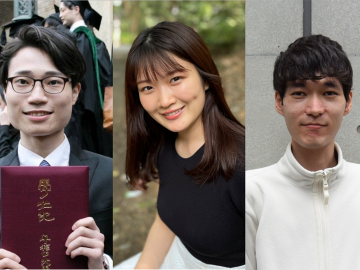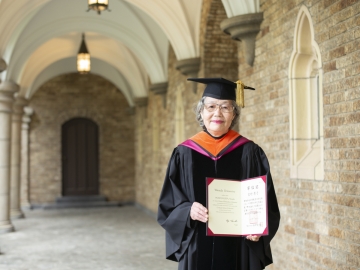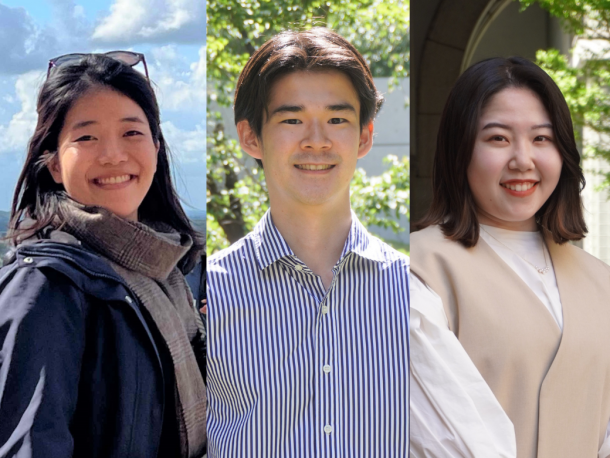
(From left to right) Ms. Katsube, Mr. Ito, and Ms. Kobayashi
Graduate school is a place for further education and professional research based on the knowledge and theories acquired at the undergraduate level. However, some undergraduates may find it difficult to understand what it actually involves because of the impression formed owing to people asking questions such as, “Isn’t that just for science students?” and “Will it be difficult to find employment?” Thus, we interviewed two current Waseda University graduate students, and another student who is currently studying in Paris, France, under the international exchange program of the School of International Liberal Studies (SILS). We asked each of them regarding their expectations from graduate school, their concerns and realities before enrolling, and their outlook for the future. Further, comments from academic advisors and frequently asked questions about graduate school have also been included. This will elucidate the unknown aspects of a graduate school, making it a familiar and realistic option for one’s future.
▼ Graduate School of Commerce: Kosuke Ito (School of Commerce)
“Two years of graduate school is not falling behind, but an advantage in life”
▼Graduate School of Japanese Applied Linguistics: Wakako Kobayashi (School of Law)
“The joy of graduate school is in being able to think until your head hurts and discuss things completely”
▼Paris Institute of Political Studies: Maki Katsube (School of International Affairs)
“The appeal of European graduate schools is being able to choose a general way of learning rather than a research-oriented way.”
◎FAQs about Graduate School
Two years of graduate school is not falling behind, but an advantage in life
Kosuke Ito, 2nd Year Master’s Student, Graduate School of Commerce
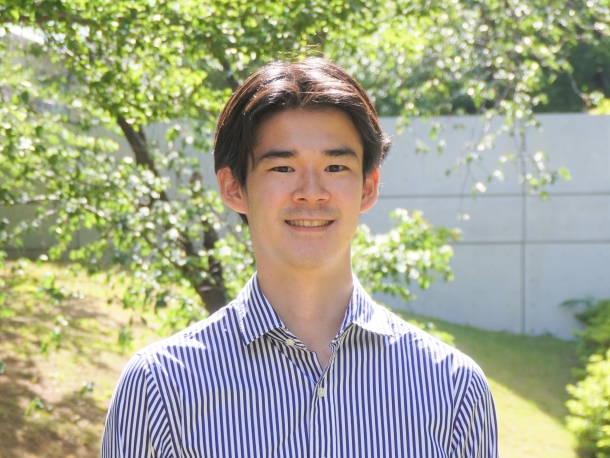 ――What inspired you to pursue graduate school?
――What inspired you to pursue graduate school?
I began considering it seriously around the spring break of my third year at university. I was working with a fourth-year student in the same laboratory, and we researched together for our graduation thesis. During that period I realized for the first time how research could be fascinating and appealing: formulating a hypothesis and proving it yourself.
At that time, I had in mind three career paths after completing my undergraduate degree: “to find a job,” “to join a graduate school overseas including studying abroad,” or “studying abroad in a language school or a working holiday.” However, the COVID-19 pandemic made overseas education difficult, and my parents stated that, “It would be excellent if you find a regular job, but you could consider studying for two years.” That is when I began considering graduate school.
――Did you have any anxieties or worries before you enrolled in graduate school?
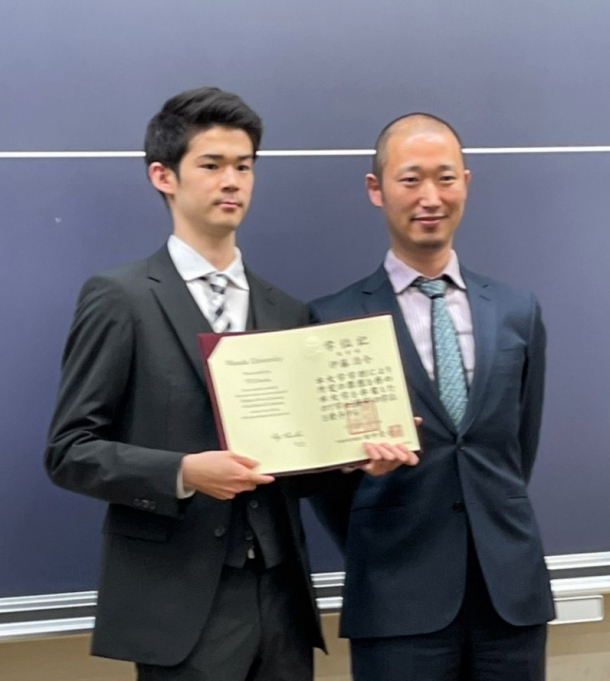
At the School of Commerce graduation ceremony with academic advisor, Professor Murase.
Certainly, I did. My impression of a graduate school was, “a place for brilliant people, outside my reach.” I was particularly worried about whether I could keep up with the people involved in research, and how much time I would have to commit to it.
However, my current advisor from my undergraduate days, Professor Toshiro Murase (Associate Professor at the School of Commerce), recommended I continue to graduate school, and I am glad that I did.
Continuing from my undergraduate, I have been conducting research under Professor Murase on the subject of “leadership” under organizational behavior theory. I did not expect that I would like to research so much. I have been able to dispel any worries I had before graduate school.
――What are your thoughts on future options after completing your master’s degree?
I had an unclear view of my future before I entered graduate school. Now that I am actually here, I believe that a doctoral program would be interesting. I could also live a life of a researcher at a think tank or something similar. However, in any case, I want to pursue something. Now, I can clearly understand what I want to do and the path I want to follow in the future because I was able to immerse myself in a single field at graduate school.
Murase Sensei said to me, “After you become a working adult, you receive limited time for learning. In fact, two years of graduate school confers an advantage that you cannot overturn quickly.” Instead of rushing into the workforce, you can learn professional expertise in graduate school; it is not two years of falling behind, but rather an advantage in life.”
――You also studied abroad at Bocconi University in Italy for six months, from the fall of the first year of your master’s degree. What did you learn from your experience?
The manner of considering graduate school is completely different in Italy as compared with Japan. To begin with, several people in Italy attend graduate school to acquire a job, and over 100 people attended lectures. Owing to this, the students had different backgrounds, and their motivations for studying were also different from what we find in Japan. It was amazing to experience these cultural differences.

Attending a football match between Inter Milan and FC Barcelona with fellow graduate students at Bocconi University. Mr. Ito is on the right.
――What advice or message would you provide to undergraduates who are considering graduate school?
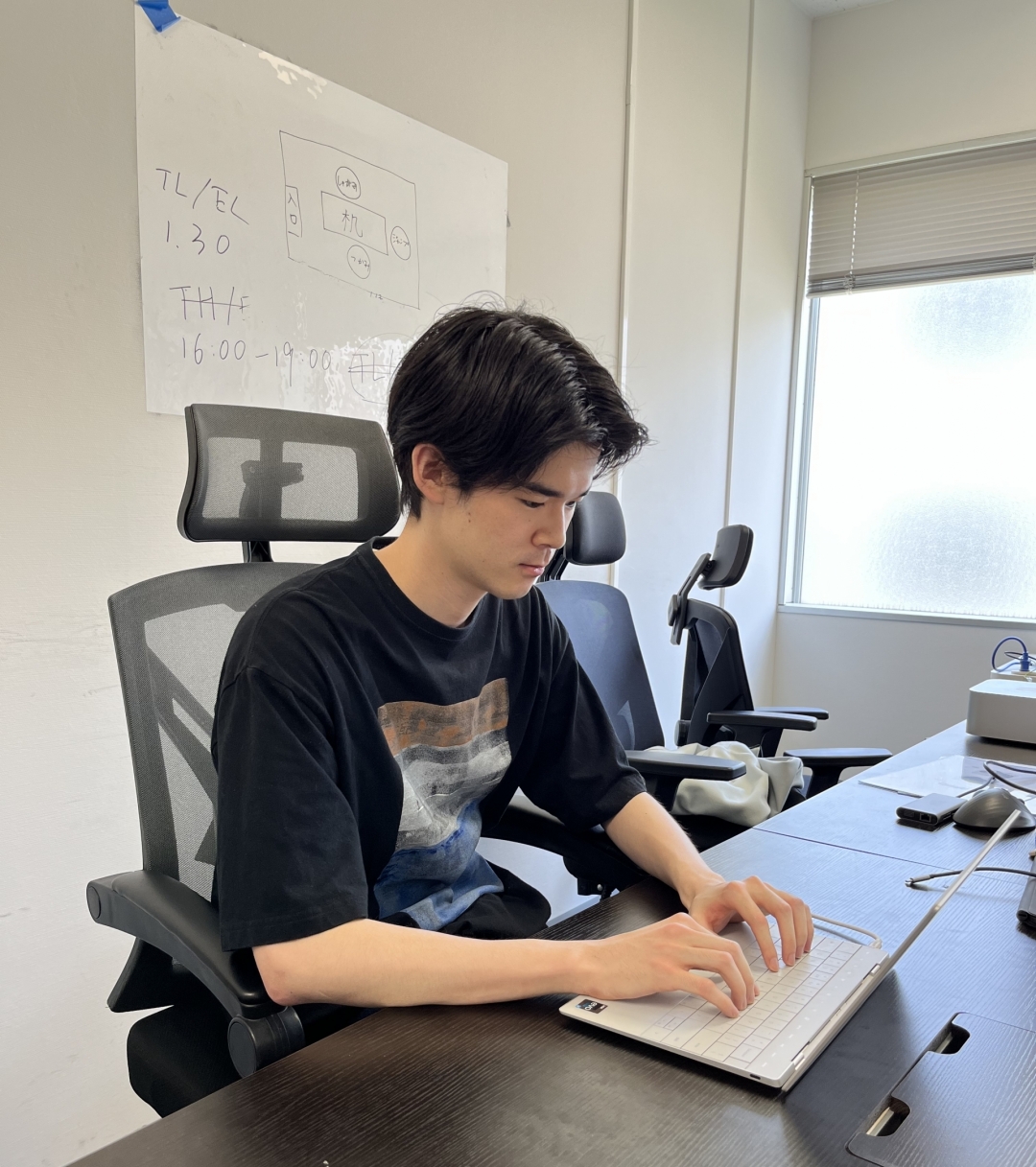
Mr. Ito is also very interested in programming. In the laboratory.
The educational system of Japan has a sense of “following the crowd” where everyone goes from high school to university and graduates in four years. However, I believe that once you go out into society, regardless of whether you are categorized as a “working adult” or not, everyone takes on completely different paths.
Some people worry that by going to graduate school, they will not become a member of society immediately. However, I believe that we are now in the phase where each of us can lead our own unique life. Do not be influenced by those around you, and if you are interested, have the courage to take the plunge.
A Word from the Academic Advisor!
Associate Professor Toshiro Murase (School of Commerce)
People often worry, “Isn’t graduate school a place only for special people?” however, there is no need. As the saying goes, “People make the place.” A month after transition from “undergraduate student” to “graduate student,” all students change their way of thinking and begin studying diligently. Mr. Ito had the same concerns when he entered the Graduate School of Commerce;, however, now he can read three very difficult English papers a week, as well as several other papers written by consultants and research institutes both in Japan and abroad, rewrite them in a simple format for companies, and submit them. Although graduate school is indeed a place to study technical and specialized fields, I believe it is a unique and valuable place where students can ultimately pursue the romantic goal of “understanding how the new world works.” Why do you not join us in this exciting intellectual adventure?
Graduate School of Commerce Website:https://www.waseda.jp/fcom/gsc/
The joy of graduate school is in being able to think until your head hurts and discuss things completely
Wakako Kobayashi, 2nd Year Master’s Student, Graduate School of Japanese Applied Linguistics
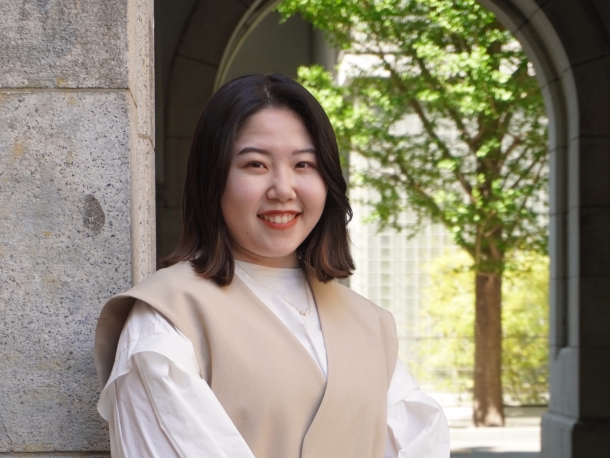 ――From the School of Law, what made you decide to enroll in the Graduate School of Japanese Applied Linguistics?
――From the School of Law, what made you decide to enroll in the Graduate School of Japanese Applied Linguistics?
During my third year of university, I was worried about finding a job, I reconsidered what I wanted to do in the future and the type of work I wanted to do. Out of my options, I wanted to be involved in Japanese language education overseas, and when I researched, I learned that there was a Graduate School of Japanese Applied Linguistics at Waseda University, which was a catalyst for me.
――Why did you want to be involved in Japanese language education overseas?
There are two significant reasons. First, I visited Hawaii as a sophomore at the university as part of a volunteer group, the Educational Support for Charter Schools ~Hawaii Chapter~. As part of their activities, I had an opportunity to teach the Japanese language and culture. I could never forget my surprise at discovering that there were people who enjoyed learning about Japan so much.
The other reason was that I have always wanted to help eliminate discrimination and prejudice in society. Through the mutual learning of cultures and learning other languages, we are able to recognize each other’s differences, and therefore, I wanted to engage in Japanese language education with the belief that it could reduce discrimination and prejudice even if only to a small extent.
――Did you consult with anyone before enrolling in graduate school?
I discussed about it with my parents, however I was worried since no one around me had attended a graduate school. However, the Graduate School of Japanese Applied Linguistics held an information session during admission where I was able to directly speak with current graduate students and professors and ask for advice on how to proceed to graduate school. That was very helpful.
For me, there was no written test or entrance examination, and I was selected through an interview after submitting a statement of purpose and a research plan. It was my first attempt at writing a research plan, however, I managed to complete it by reading several previous studies and contemplating what I wanted to learn.
――Which are the most common departments for students in the Graduate School of Japanese Applied Linguistics? Additionally, what type of research are you actually performing there?
Half of my classmates are international students. The other half are from Japan, and many of them are from faculties of education and literature. The students I study with are diverse in their nationalities, career, and age, and I believe one of the characteristics of this program is that it allows me to interact with people from various backgrounds.
My current research theme is “Unconscious Bias” in Japanese Language Teaching Materials. For example, textbooks often have gender bias such as women are often mothers. I am studying teaching materials used in Japanese language education from this perspective.
My academic advisor, Professor Mina Kobayashi (Professor, Faculty of International Research and Education), is very warm and sincere and provides ample advice;, therefore, I always learn much from her. Beginning this year, I have been able to spend my days in a fulfilling manner, with seminars in the laboratory (2 sessions per week), practical training in teaching Japanese at the Center for Japanese Language of Waseda University (2 sessions per week), and a part-time job for 2 days per week, which is related to Japanese language education close to the content of my research.
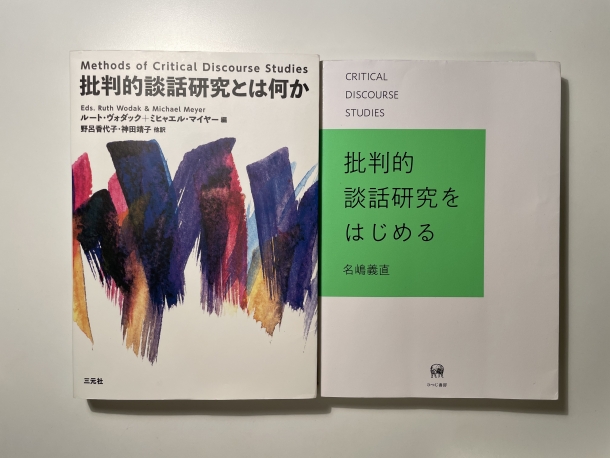
Literature on critical discourse research about the research topic.
――What are your plans for the future?
I would like to work at a Japanese language education institution overseas as a teacher. Before entering graduate school, I had heard that it was difficult to obtain a job, however, that is not actually true. Several people around me have opted to work as Japanese language teachers or in jobs related to Japanese language education, while others search for jobs and find employment in private companies in other fields.
――What do you believe is the benefit of your education at the School of Law? How has your study schedule changed compared with your undergraduate days?
Law schools require logical thinking based on the law. I believe I am using that skill in writing my master’s thesis and reports.
The difference between university and graduate school is not in the number of assignments, but the fact that you have to think so hard that your head hurts. Certainly, I had to think hard in undergraduate school too, however, in graduate school, I have to think more about why I think the way I do, and how I think.
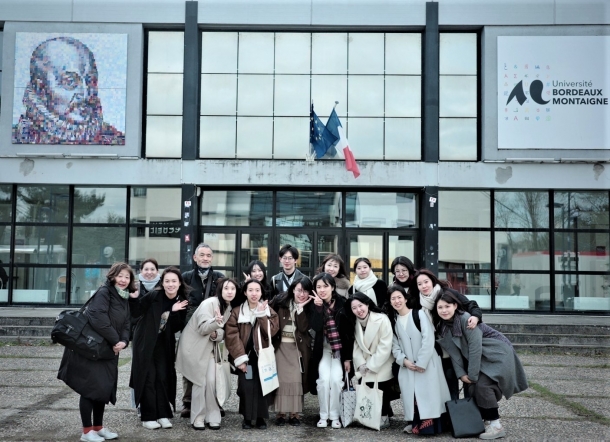
Group photograph at the University of Bordeaux-Montaigne in France visited as part of a laboratory’s training camp. Dr. Kobayashi, the academic advisor is on the far left, and the third person from the right in the front row is Ms. Kobayashi.
In seminar presentations, which are conducted once a month, students discuss with each other until they are satisfied with each other’s presentation. Although it is considerable work, I enjoy being able to discuss things thoroughly in graduate school because I had few opportunities for face-to-face discussions during the latter half of my undergraduate years owing to the COVID-19 pandemic. I believe I was able to overcome any problems because I have friends whom I can work hard with.
A Word from the Academic Advisor!
The photograph above displays the seminar camp at the University of Bordeaux-Montaigne in France, organized and realized by Ms. Kobayashi, conducting negotiations with the host institution to the creation of a schedule incorporating classes and facility tours. In addition, when there was a professor at the University of the Ryukyus whom she wanted to talk to, Ms. Kobayashi planned and realized an invited lecture using the university’s budget. I believe that she has grown into a truly reliable graduate student who has acquired the ability to take steps to learn various aspects on her own initiative, even outside of her daily research. The Graduate School of Japanese Applied Linguistics is an independent graduate school without an undergraduate degree. Therefore, it may be difficult for undergraduate students to gauge what they will be studying here. We at the Graduate School of Japanese Applied Linguistics offer a minor in Japanese language education at the Global Education Center. Undergraduate students who are interested in Japanese language education can experience the depth and breadth of Japanese language education through these classes.
Graduate School of Japanese Applied Linguistics Website:https://www.waseda.jp/fire/gsjal/
Interview and text: Naoto Oguma (Graduated from the School of Letters, Arts and Sciences II in 2002)
“The appeal of European graduate schools is being able to select a general way of learning rather than a research-oriented way”
Maki Katsube, 1st Year Master’s Program in the School of International Affairs, Paris Institute of Political Studies
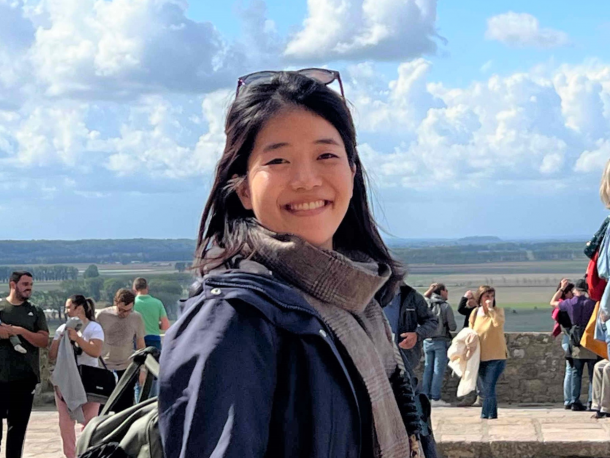
――Please tell us how you came to enroll in the master’s program at the Paris Institute of Political Studies.
When I first entered Waseda University, my goal was to study abroad at Peking University from my sophomore year through the SILS double degree program. However, although I successfully obtained my ticket to Peking University, it was canceled owing to the COVID-19 pandemic. After some time, a friend from my department provided me information regarding the 5BM program (※) that was recruiting its first class of students. I had lived in Taiwan during my elementary and junior high school years and I was interested in Chinese politics, however, I changed my perspective to consider that it would be better to study Chinese politics from a distance such as from Europe rather than from China, where regulations are very strict. After working with my seminar professor to prepare and submit a research plan and other documents, I successfully passed the internal selection process and the final selection process in Paris, and in September of my senior year, I joined the Paris Institute of Political Studies.
(※)A five-year bachelor’s and master’s program between the School of International Liberal Studies and the Paris Institute of Political Studies (Sciences Po). By meeting the completion requirements stipulated by both universities, students will be awarded a Bachelor of International Liberal Studies degree from Waseda University at the end of the fourth year, and a Master’s degree from the Paris Institute of Political Science after five and a half years (Fifth year for September enrollees). Up to five students are dispatched every academic year.
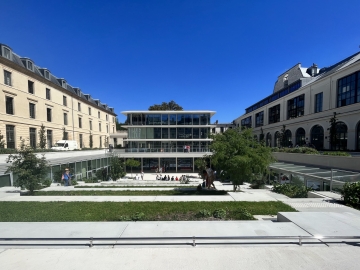
The Paris Institute of Political Science is located in the heart of Paris. It has produced many bureaucrats, politicians, and officials of international organizations.
――This summer marks one year. How is graduate school life in Paris?
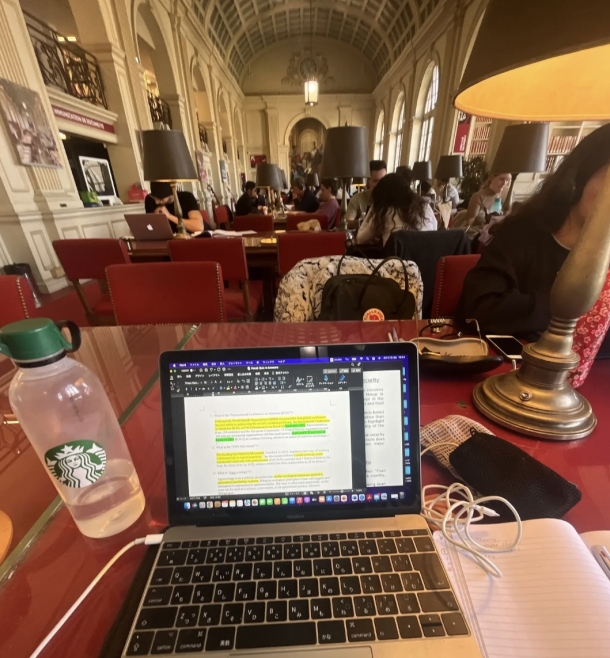
The library in the International House of the Cité internationale universitaire de Paris, where Ms. Katsube lives in the dormitory. Every day after classes is over, she stays in the library to study until night.
In Europe, it is normal to pursue a master’s or doctoral degree if you go on to university university since there are more job opportunities. Perhaps that is why there are many graduate schools where students can study widely about the field in which they wish to work, rather than pursuing a single field of research. The course I am currently attending is a program where I can learn about international affairs in a general way, which is critical if I want to work for an international organization.
However, the studies are quite challenging. I believe I studied much when I was at Waseda; my GPA was always on my mind, however, now I feel as though I am studying six or seven times as much as I did then. There are many examinations where you have to keep writing for three hours straight, and you cannot readily pass if you have only superficial knowledge.
――What are your goals and future prospects?
My second and final semester of my Master’s program will begin this fall. At the Paris Institute of Political Science, you are required to do either an internship, write a thesis, or study abroad, and I plan to select the internship option. I have my expectations set on international organizations and think tanks in Paris for now, such as the Organization for Economic Cooperation and Development (OECD), and I have been sending out several internship applications.
After completing my Master’s program, my goal is to acquire a job in an international organization in Europe. I plan not to return to Japan for a while, and I want to focus on building my foundation here.
――What advice or message would you provide to undergraduates who are considering graduate school?
Before coming to France, I was somewhat worried that I would be a year and a half behind my friends who would be beginning to work. However, I am proud to say that my perspective and options for the future have expanded to a degree that I could not have imagined two years ago. Graduate schools abroad sound intimidating, however, I strongly recommend that students who want to work on a global scale eventually go on to graduate school and acquire a Master’s degree!
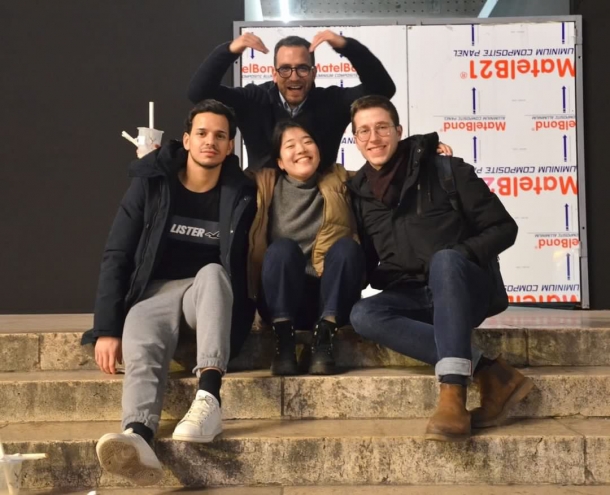
The Cité Universitaire, a dormitory for students and researchers, is located at the southern end of the 14th arrondissement of Paris, and the premises have buildings bearing the names of countries from worldwide, including the Japan Pavilion, the United States, Germany, and Switzerland. This is a picture of Ms. Katsube with her fellow students at the Tunisian Pavilion, where she lives. “As an international student, I was interested in experiencing different cultures, therefore, I requested a building outside the Japan Pavilion and was sent to the Tunisia Pavilion,” said Ms. Katsube.
About the School of International Affairs 5BM Program: https://www.waseda.jp/fire/sils/students/abroad/
FAQs about Graduate School
Q. A Master’s degree takes two years to complete, which appears lengthy.
A. Some graduate schools also offer one-year programs. In addition, some graduate schools offer a “5-year integrated undergraduate and master’s degree system” which condenses two years of study into one by including advanced studies while students remain enrolled in the undergraduate program.
Q.I am concerned about my employment prospects.
A. A. Compared with undergraduate students, graduate students are expected to have more “problem-solving skills” when searching for a job. If you can acquire “problem-solving skills” in your research life (setting your own issues, formulating hypotheses, verifying and analyzing them, and summarizing the results in papers and presentations), you will have a much wider range of choices in the industry when you reach the stage of employment.
Employment rates and employers of graduates from each graduate school are available on the Career Center website (information for 2022 will be available around July) and on the websites of each graduate school.
Q. After graduating from undergraduate school, I may I return to graduate school after working?
A.Many students re-enter Waseda University graduate schools after acquiring experience as working adults, and some graduate schools offer entrance examinations for working adults and AO entrance examinations. Some graduate schools also offer evening classes for students who study while working. You can use the Admission Center’s dedicated Web site to determine the graduate school that best corresponds to the requirements of your lifestyle.
Detailed information about the graduate schools is available on the websites of each graduate school. The Admission Center Web site also provides various information on graduate schools, including information on entrance examinations.

